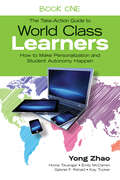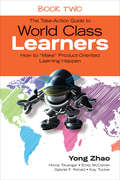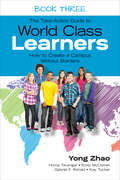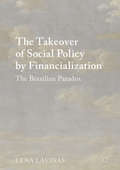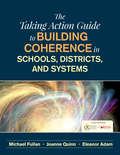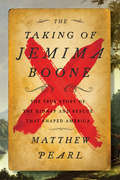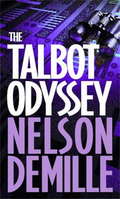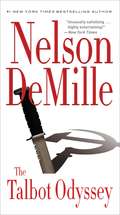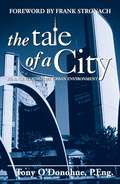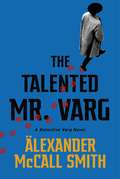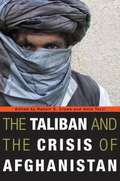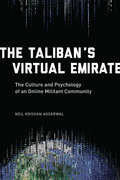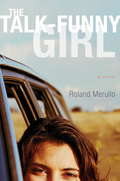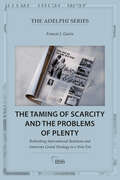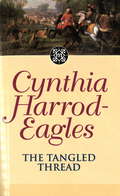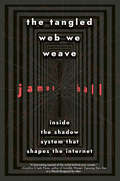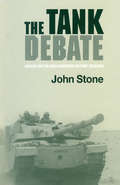- Table View
- List View
The Take-Action Guide to World Class Learners Book 1: How to Make Personalization and Student Autonomy Happen
by Yong Zhao Homa S. Tavangar Emily E. McCarren Gabriel F. Rshaid Kay F. TuckerYour blueprint to entrepreneur-minded schooling The Take-Action Guide to World Class Learners series provides the most complete information available on designing twenty-first century schools poised to leapfrog into the future! These practice-oriented books expand on Dr. Yong Zhao’s acclaimedWorld Class Learners, which presents a new framework for cultivating creative and entrepreneurial students. Now, with this first book in the follow-up three-volume set, Zhao digs much deeper, revealing how exactly to put that framework into effect. This first book in the series provides specific strategies and practical advice on how to Incorporate student choice for flexible, student-focused curriculum Motivate students to turn strengths into passions Cultivate students’ technical, creative, decision making, and communication skills Implement Zhao’s new paradigm shift one phase at a time, starting with Book 1. Better yet, read all three volumes for a complete blueprint to entrepreneur-minded schooling. "The ideal school should provide opportunities and resources to enable students to personalize their educational experiences instead of receiving a uniform standardized, externally prescribed, education diet." --Yong Zhao
The Take-Action Guide to World Class Learners Book 1: How to Make Personalization and Student Autonomy Happen
by Yong Zhao Homa S. Tavangar Emily E. McCarren Gabriel F. Rshaid Kay F. TuckerYour blueprint to entrepreneur-minded schooling The Take-Action Guide to World Class Learners series provides the most complete information available on designing twenty-first century schools poised to leapfrog into the future! These practice-oriented books expand on Dr. Yong Zhao’s acclaimedWorld Class Learners, which presents a new framework for cultivating creative and entrepreneurial students. Now, with this first book in the follow-up three-volume set, Zhao digs much deeper, revealing how exactly to put that framework into effect. This first book in the series provides specific strategies and practical advice on how to Incorporate student choice for flexible, student-focused curriculum Motivate students to turn strengths into passions Cultivate students’ technical, creative, decision making, and communication skills Implement Zhao’s new paradigm shift one phase at a time, starting with Book 1. Better yet, read all three volumes for a complete blueprint to entrepreneur-minded schooling. "The ideal school should provide opportunities and resources to enable students to personalize their educational experiences instead of receiving a uniform standardized, externally prescribed, education diet." --Yong Zhao
The Take-Action Guide to World Class Learners Book 2: How to "Make" Product-Oriented Learning Happen
by Yong Zhao Homa S. Tavangar Emily E. McCarren Gabriel F. Rshaid Kay F. TuckerYour blueprint for product-oriented learning The World Class Learners series provides the most complete information available on designing twenty-first century schools poised to leapfrog into the future! These practice-oriented books expand on Dr. Yong Zhao’s acclaimed World Class Learners, which presents a new framework for cultivating creative and entrepreneurial students. Now, with this second book in the follow-up three-volume set, Zhao digs much deeper, revealing how exactly to put that framework into effect. The second book in the series outlines how to Understand entrepreneurship and project-oriented learning Implement "making-as-learning" POL curriculum Help students create quality entrepreneurial products Understand ownership, copyrights, and patents Implement Zhao’s new paradigm shift one phase at a time, starting with any book, depending upon your priorities. Better yet, read all three volumes for a complete blueprint to entrepreneur-minded schooling. "The ideal school should provide opportunities and resources to enable students to personalize their educational experiences instead of receiving a uniform standardized, externally prescribed, education diet." -Yong Zhao
The Take-Action Guide to World Class Learners Book 2: How to "Make" Product-Oriented Learning Happen
by Yong Zhao Homa S. Tavangar Emily E. McCarren Gabriel F. Rshaid Kay F. TuckerYour blueprint for product-oriented learning The World Class Learners series provides the most complete information available on designing twenty-first century schools poised to leapfrog into the future! These practice-oriented books expand on Dr. Yong Zhao’s acclaimed World Class Learners, which presents a new framework for cultivating creative and entrepreneurial students. Now, with this second book in the follow-up three-volume set, Zhao digs much deeper, revealing how exactly to put that framework into effect. The second book in the series outlines how to Understand entrepreneurship and project-oriented learning Implement "making-as-learning" POL curriculum Help students create quality entrepreneurial products Understand ownership, copyrights, and patents Implement Zhao’s new paradigm shift one phase at a time, starting with any book, depending upon your priorities. Better yet, read all three volumes for a complete blueprint to entrepreneur-minded schooling. "The ideal school should provide opportunities and resources to enable students to personalize their educational experiences instead of receiving a uniform standardized, externally prescribed, education diet." -Yong Zhao
The Take-Action Guide to World Class Learners Book 3: How to Create a Campus Without Borders
by Yong Zhao Homa S. Tavangar Emily E. McCarren Gabriel F. Rshaid Kay F. TuckerYour blueprint for nurturing globally connected students! Help your students learn for, with, and from anyone, anywhere in the world. This powerful resource from respected expert Dr. Yong Zhao helps educators at all levels build a globalized learning environment that fosters students’ cultural and entrepreneurial competencies. This third volume in Zhao’s three-book set outlines how to: Transform students into strong, responsible global citizens Leverage experts, networks, and partner school relationships Implement a “glocalized” Global Campus or classroom Upgrade your school or classroom. Use this practical guide to build a world-class education for your students!
The Take-Action Guide to World Class Learners Book 3: How to Create a Campus Without Borders
by Yong Zhao Homa S. Tavangar Emily E. McCarren Gabriel F. Rshaid Kay F. TuckerYour blueprint for nurturing globally connected students! Help your students learn for, with, and from anyone, anywhere in the world. This powerful resource from respected expert Dr. Yong Zhao helps educators at all levels build a globalized learning environment that fosters students’ cultural and entrepreneurial competencies. This third volume in Zhao’s three-book set outlines how to: Transform students into strong, responsible global citizens Leverage experts, networks, and partner school relationships Implement a “glocalized” Global Campus or classroom Upgrade your school or classroom. Use this practical guide to build a world-class education for your students!
The Takeover of Social Policy by Financialization
by Lena LavinasThis book critically addresses the model of social inclusion that prevailed in Brazil under the rule of the Workers Party from the early 2000s until 2015. It examines how the emergence of a mass consumer society proved insufficient, not only to overcome underdevelopment, but also to consolidate the comprehensive social protection system inherited from Brazil's 1988 Constitution. By juxtaposing different theoretical frameworks, this book scrutinizes how the current finance-dominated capitalism has reshaped the role of social policy, away from rights-based decommodified benefits and towards further commodification. This constitutes the Brazilian paradox: how a center-left government has promoted and boosted financialization through a market incorporation strategy using credit as a lever for expanding financial inclusion. In so doing, it has pushed the subjection of social policy further into the logic of financial markets.
The Taking Action Guide to Building Coherence in Schools, Districts, and Systems
by Michael FullanGet there faster: Your road map to smart, sustainable change! Taking Action is a hands-on guide to the groundbreaking book, Coherence: The Right Drivers in Action for Schools, Districts and Systems, providing step-by-step protocols to help foster deep coherence for maximum student learning—all within a reasonably short time frame. You’ll develop: Deeper understanding of The Coherence Framework A 100-Day Coherence Plan Leadership, capacity, and coalition-building skills Systems and tools to assess your organization Includes video links, print resources, case studies, and diagnostic and planning tools. Fostering greater coherence is at your fingertips with this instant action guide!
The Taking Action Guide to Building Coherence in Schools, Districts, and Systems
by Michael FullanGet there faster: Your road map to smart, sustainable change! Taking Action is a hands-on guide to the groundbreaking book, Coherence: The Right Drivers in Action for Schools, Districts and Systems, providing step-by-step protocols to help foster deep coherence for maximum student learning—all within a reasonably short time frame. You’ll develop: Deeper understanding of The Coherence Framework A 100-Day Coherence Plan Leadership, capacity, and coalition-building skills Systems and tools to assess your organization Includes video links, print resources, case studies, and diagnostic and planning tools. Fostering greater coherence is at your fingertips with this instant action guide!
The Taking of Jemima Boone: Colonial Settlers, Tribal Nations, and the Kidnap That Shaped America
by Matthew Pearl“A rousing tale of frontier daring and ingenuity, better than legend on every front.” — Pulitzer Prize–winning author Stacy SchiffA Goodreads Most Anticipated Book In his first work of narrative nonfiction, Matthew Pearl, bestselling author of acclaimed novel The Dante Club, explores the little-known true story of the kidnapping of legendary pioneer Daniel Boone’s daughter and the dramatic aftermath that rippled across the nation. On a quiet midsummer day in 1776, weeks after the signing of the Declaration of Independence, thirteen-year-old Jemima Boone and her friends Betsy and Fanny Callaway disappear near the Kentucky settlement of Boonesboro, the echoes of their faraway screams lingering on the air.A Cherokee-Shawnee raiding party has taken the girls as the latest salvo in the blood feud between American Indians and the colonial settlers who have decimated native lands and resources. Hanging Maw, the raiders’ leader, recognizes one of the captives as Jemima Boone, daughter of Kentucky's most influential pioneers, and realizes she could be a valuable pawn in the battle to drive the colonists out of the contested Kentucky territory for good.With Daniel Boone and his posse in pursuit, Hanging Maw devises a plan that could ultimately bring greater peace both to the tribes and the colonists. But after the girls find clever ways to create a trail of clues, the raiding party is ambushed by Boone and the rescuers in a battle with reverberations that nobody could predict. As Matthew Pearl reveals, the exciting story of Jemima Boone’s kidnapping vividly illuminates the early days of America’s westward expansion, and the violent and tragic clashes across cultural lines that ensue.In this enthralling narrative in the tradition of Candice Millard and David Grann, Matthew Pearl unearths a forgotten and dramatic series of events from early in the Revolutionary War that opens a window into America’s transition from colony to nation, with the heavy moral costs incurred amid shocking new alliances and betrayals.
The Talbot Odyssey
by Nelson DeMilleFor forty years Western intelligence agents have known a terrible secret: the Russians have a mole - code-named Talbot - inside the CIA. At first Talbot is suspected of killing European agents. Then a street-smart ex-cop uncovers a storm of espionage and murder on the streets of New York, while in a Long Island suburb a civic demonstration against the Russian mission masks a desperate duel of nerves and wits. Engineered by Talbot, a shadow world of suspicion and deceit is spilling onto the streets - leading to a new Soviet weapon and a first-strike war plan threatening the foundations of American government. For the U.S., time is running out. For Talbot, the time is now...
The Talbot Odyssey
by Nelson DemilleIT STARTED AS A SIMPLE SPY HUNT.IT BECAME A DESPERATE BATTLE TO SAVE THE WEST.For forty years Western intelligence agents have known a terrible secret: the Russians have a mole -- code-named Talbot -- inside the CIA. At first Talbot is suspected of killing European agents. Then a street-smart ex-cop uncovers a storm of espionage and murder on the streets of New York, while in a Long Island suburb a civic demonstration against the Russian mission masks a desperate duel of nerves and wits.Engineered by Talbot, a shadow world of suspicion and deceit is spilling onto the streets -- leading to a new Soviet weapon and a first-strike war plan threatening the foundations of American government.For the U.S., time is running out. For Talbot, the time is now.
The Tale of a City: Re-engineering the Urban Environment
by Tony O'DonohueThere is a complex web of infrastructure behind the day-to-day operation of a Canadian city. Flick the switch and the light comes on; turn the tap and the water is there; flush the toilet and the sewage disappears. But what price are we paying for these services that make our lives easier? In an age of blackouts, water problems, overflowing sewers, dangerously smoggy skies, and overburdened highways - problems that have led to an increasingly fragile environment with serious consequences for all Canadians - author Tony O’Donohue offers The Tale of a City, an essential primer in helping us to understand and improve our relationships with our engineered and natural environments.
The Talented Mr Varg: A Detective Varg novel (Detective Varg)
by Alexander McCall SmithThe second book in Alexander McCall Smith's new DETECTIVE VARG series . . .'Reading the novel feels like a form of meditation . . . There is much to enjoy' ScotsmanSpring is coming slowly to Sweden - though not quite as slowly as Detective Ulf Varg's promised promotion at the Department of Sensitive Crimes. For Varg, referred by his psychoanalyst to group therapy at Malmö's Wholeness Centre, life now seems mostly a circle of self-examination, something which may or may not be useful when it comes to the nature of his profession and the particularly sensitive cases that have recently come to light.All in a day's work for Detective Varg, except that one of his new investigations involves fellow detective Anna; it will require every ounce of self-discipline he has in order to remain professional. The other, more curious case is centred around internationally successful novelist Nils Personn-Cederström. According to his girlfriend, Cederström is being blackmailed - but by whom and for what reason?Accompanied by his irritating but kindly colleague Blomquist, Varg begins his enquiries and soon the answers fall neatly into place. Nothing and no one is ever that simple, however, and not for the first time he learns as much about his own emotional and moral landscape as he does about the motives of others. Now Varg must make a possibly life-changing decision. Will he choose his own happiness over that of his heart's desire?
The Taliban and the Crisis of Afghanistan
by Robert D. Crews Amin TarziOffering an invaluable guide to "what went wrong" with the American reconstruction project in Afghanistan, this book accounts for the persistence of a powerful and enigmatic movement while simultaneously mapping Afghanistan's enduring political crisis.
The Taliban and the Crisis of Afghanistan
by Robert D. Crews and Amin TarziThe Taliban remain one of the most elusive forces in modern history. A ragtag collection of clerics and madrasa students, this obscure movement emerged out of the rubble of the Cold War to shock the world with their draconian Islamic order. The Taliban refused to surrender their vision even when confronted by the United States after September 11, 2001. Reinventing themselves as part of a broad insurgency that destabilized Afghanistan, they pledged to drive out the Americans, NATO, and their allies and restore their "Islamic Emirate." The Taliban and the Crisis of Afghanistan explores the paradox at the center of this challenging phenomenon: how has a seemingly anachronistic band of religious zealots managed to retain a tenacious foothold in the struggle for Afghanistan's future? Grounding their analysis in a deep understanding of the country's past, leading scholars of Afghan history, politics, society, and culture show how the Taliban was less an attempt to revive a medieval theocracy than a dynamic, complex, and adaptive force rooted in the history of Afghanistan and shaped by modern international politics. Shunning journalistic accounts of its conspiratorial origins, the essays investigate broader questions relating to the character of the Taliban, its evolution over time, and its capacity to affect the future of the region. Offering an invaluable guide to "what went wrong" with the American reconstruction project in Afghanistan, this book accounts for the persistence of a powerful and enigmatic movement while simultaneously mapping Afghanistan's enduring political crisis.
The Taliban's Virtual Emirate: The Culture and Psychology of an Online Militant Community
by Neil Krishan AggarwalApplying cutting-edge psychiatric theories to an analysis of online Taliban literature in four languages, Neil Krishan Aggarwal constructs a game-changing narrative of the organization's broad appeal and worldview.Aggarwal, a cultural psychiatrist, focuses on the Taliban's creation of culture, evoking religion in Arabic and English writings, nationalism in Dari sources, and regionalism in Urdu texts. The group also promotes a specific form of argumentation, citing religious scriptures in Arabic works, canonical poets in Dari and Urdu writings, and scholars and journalists in English publications. Aggarwal shows how the Taliban categorize all Muslims as members and all non-Muslims as outsiders; how they convince Muslims of the need for violence; and how they apply the insider/outsider dichotomy to foreign policy. By understanding these themes, Aggarwal argues, we can craft better countermessaging strategies.
The Talk-Funny Girl
by Roland MerulloIn one of the poorest parts of rural New Hampshire, teenage girls have been disappearing, snatched from back country roads, never to be seen alive again. For seventeen-year-old Marjorie Richards, the fear raised by these abductions is the backdrop to what she lives with her own home, every day. Marjorie has been raised by parents so intentionally isolated from normal society that they have developed their own dialect, a kind of mountain hybrid of English that displays both their ignorance of and disdain for the wider world. Marjorie is tormented by her classmates, who call her "The Talk-funny girl," but as the nearby factory town sinks deeper into economic ruin and as her parents fall more completely under the influence of a sadistic cult leader, her options for escape dwindle. But then, thanks to a loving aunt, Marjorie is hired by a man, himself a victim of abuse, who is building what he calls "a cathedral," right in the center of town. Day by day, Marjorie's skills as a stoneworker increase, and so too does her intolerance for the bitter rules of her family life. Gradually, through exposure to the world beyond her parents' wood cabin thanks to the kindness of her aunt and her boss, and an almost superhuman determination, she discovers what is loveable within herself. This newfound confidence and self-esteem ultimately allows her to break free from the bleak life she has known, to find love, to start a family, and to try to heal her old, deep wounds without passing that pain on to her husband and children. By turns darkly menacing and bright with love and resilience, The Talk-Funny Girl is the story of one young woman's remarkable courage, a kind of road map for the healing of early abuse, and a testament to the power of kindness and love. From the Hardcover edition.
The Taming of Democracy Assistance
by Sarah Sunn BushFew government programs that aid democracy abroad today seek to foster regime change. Technical programs that do not confront dictators are more common than the aid to dissidents and political parties that once dominated the field. What explains this 'taming' of democracy assistance? This book offers the first analysis of that puzzle. In contrast to previous research on democracy aid, it focuses on the survival instincts of the non-governmental organizations (NGOs) that design and implement democracy assistance. To survive, Sarah Bush argues that NGOs seek out tamer types of aid, especially as they become more professional. Diverse evidence - including three decades of new project-level data, case studies of democracy assistance in Jordan and Tunisia, and primary documents gathered from NGO archives - supports the argument. This book provides new understanding of foreign influence and moral actors in world politics, with policy implications for democracy in the Middle East.
The Taming of Free Speech
by Laura WeinribLaura Weinrib shows how a coalition of lawyers and activists made judicial enforcement of the Bill of Rights a defining feature of American democracy. Protection of civil liberties was a calculated bargain between liberals and conservatives to save the courts from New Deal attack and secure free speech for both labor radicals and businesses.
The Taming of Scarcity and the Problems of Plenty: Rethinking International Relations and American Grand Strategy in a New Era (ISSN)
by Francis J. GavinThe underlying structure, incentives and costs shaping international relations, state behaviour and the nature of power are profoundly different today to how they were in the past, in ways that are scarcely recognised and widely misunderstood. For much of history, world politics was marked by profound scarcity in resources, information and security. A series of historical revolutions has largely tamed this scarcity in ways few could have imagined. These revolutions, however, have generated new, potentially catastrophic challenges for the world – the problems of plenty.In this Adelphi book, Francis J. Gavin argues that the institutions, practices, theories and policies that helped explain and largely tamed scarcity by generating massive prosperity, and which were sometimes used to justify punishing conquest, are often unsuitable for addressing the problems of plenty. Successful grand strategy in this new age of abundance requires new thinking. New conceptual lenses, innovative policies and processes, and transformed institutions will be essential for confronting and solving the problems of plenty, without undermining the expanding efforts against scarcity.
The Tangled Thread: The Morland Dynasty, Book 10 (Morland Dynasty #10)
by Cynthia Harrod-Eagles1788: the bloody revolution in France causes upheaval in the Morland family.Henri-Marie Fitzjames Stuart, bastard offshoot of the Morland family, strives to protect his daughter, Heloise, his mistress, Marie-France, and their son Morland. To this end, he binds Heloise to a loveless marriage with a Revolutionary, and allies himself with the great Danton. But in the bloodbath of the guillotine and the fall of Danton, Henri-Marie loses his head and Heloise flees to England.She is welcomed with open arms by the family, and in Yorkshire Jemima proudly witnesses three marriages amongst her turbulent brood.At least three may be an heir to Morland Place, but the seeds of disaster have already been sown.
The Tangled Thread: The Morland Dynasty, Book 10 (Morland Dynasty #10)
by Cynthia Harrod-Eagles1788: the bloody revolution in France causes upheaval in the Morland family.Henri-Marie Fitzjames Stuart, bastard offshoot of the Morland family, strives to protect his daughter, Heloise, his mistress, Marie-France, and their son Morland. To this end, he binds Heloise to a loveless marriage with a Revolutionary, and allies himself with the great Danton. But in the bloodbath of the guillotine and the fall of Danton, Henri-Marie loses his head and Heloise flees to England.She is welcomed with open arms by the family, and in Yorkshire Jemima proudly witnesses three marriages amongst her turbulent brood. At least three may be an heir to Morland Place, but the seeds of disaster have already been sown.
The Tangled Web We Weave: Inside The Shadow System That Shapes the Internet
by James BallWe all see what the internet does and increasingly don't like it, but do we know how and more importantly who makes it work that way? That's where the real power lays... <P><P>The internet was supposed to be a thing of revolutions. As that dream curdles, there is no shortage of villains to blame--from tech giants to Russian bot farms. But what if the problem is not an issue of bad actors ruining a good thing? What if the hazards of the internet are built into the system itself? <P><P>That's what journalist James Ball argues as he takes us to the root of the problem, from the very establishment of the internet's earliest protocols to the cables that wire it together. He shows us how the seemingly abstract and pervasive phenomenon is built on a very real set of materials and rules that are owned, financed, designed and regulated by very real people. <P><P>In this urgent and necessary book, Ball reveals that the internet is not a neutral force but a massive infrastructure that reflects the society that created it. And making it work for--and not against--us must be an endeavor of the people as well.
The Tank Debate: Armour and the Anglo-American Military Tradition
by John StoneIn The Tank Debate, John Stone highlights the equivocal position that armour has traditionally occupied in Anglo-American thought, and explains why - despite frequent predictions to the contrary - the tank has remained an important instrument of war. This book provides a timely and provocative study of the tank's developmental history, against the changing background of Anglo-American military thought.
